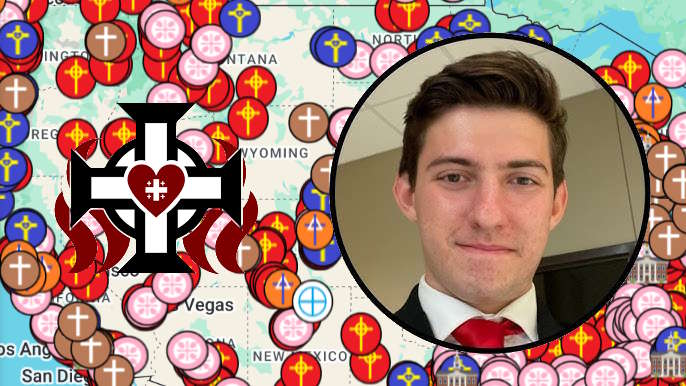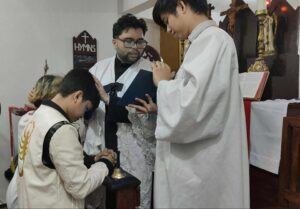Redeemed Zoomer remains an influential voice in the digital landscape of traditional Christianity, capturing the imagination of young believers worldwide. He is widely known for his advocacy of what he terms “Operation Reconquista”, serving as a rallying point to reclaim the historic Christian faith from theological liberalism. He endeavours to do this by retaking mainline Protestant denominations from within to restore them to their confessional origins.
This vision resonates deeply with many young traditional Christians who have witnessed the decline of historic denominations, lamenting beautiful churches embracing teachings contrary to Scripture. However, as compelling as his vision may be, we must examine this through the lens of Scripture and the Lutheran Confessions. To this end, we will explore why such a strategy is wrongheaded from a Confessional Lutheran standpoint, as well as a more faithful path forward for Christians who seek the faith once delivered to the saints.
What is Redeemed Zoomer’s “Reconquista” Project?
The Reconquista, as articulated by Redeemed Zoomer, seeks to reclaim liberal mainline Protestant churches by having conservative Christians join these denominations and gradually transform them from within. This includes a Lutheran sub-movement as well.
The project’s goals include:
- Recovering historic church buildings and architectural beauty
- Regaining cultural and institutional influence
- Evangelizing entire denominations rather than just individuals
- Preserving Protestant heritage and traditions
- Creating a cascading effect where conservative growth outlasts liberal decline
The strategy involves five steps: pioneers joining moderate mainline churches, building conservative subcommunities, awakening existing conservatives, outlasting the liberal majority, and eventually using church governance to restore orthodox teaching.
The Reconquista taps into genuine longings among young traditional Christians who see the beauty of historic Christianity being squandered by theological compromise. The desire to preserve our heritage is commendable. However, as we’ll explore, significant challenges arise when we examine this approach through biblical and confessional lenses.
Why the “Reconquista” Strategy Faces Significant Challenges
Already, we see the biggest objection and implication of the Reconquista project is the fact that they are urging people to join apostate and heretical churches. The movement responds to this objection by claiming that one should not join a church where “the leadership is heretical”, but rather they advocate for joining a church with a relatively low progressivism level. It is evident from this that they have a very high threshold of false teaching before it is deemed “heretical”.

Underestimating the Depth of Liberalism and Feasibility
The Reconquista map of “conservative” and “moderate” churches within liberal bodies is overly optimistic. This video demonstrates that the congregations that he has recommended as salvageable frequently ordain women, celebrate Pride Month, and employ pastors denying basic tenets of Christianity.
For confessional Lutherans specifically, the women’s ordination issue creates an even more fundamental problem. Those claiming to be confessional Lutherans while remaining in churches that ordain women are in manifest error. Since confessional Lutheranism holds that women are ontologically excluded from the ministry, female officiants cannot validly consecrate the Eucharist. Unlike baptism, the church recognises no lay celebration of the Lord’s Supper. No emergency exceptions exist. When you deviate from Christ’s institution, you violate the institution. In the case of the Sacrament of the Altar, it is specifically done in connection with the Office of the Ministry. If you truly believe women cannot be pastors, then remaining in churches that ordain them means knowingly accepting invalid sacraments, which contradicts the very confessional stance you claim to maintain.
Examining their Arguments
Biblical Precedent
Operation Reconquista argues that they have a biblical precedent for their project, that in the Old Testament, God’s Temple was corrupted multiple times, but God sent prophets to purify it rather than commanding the faithful to build a new temple. Likewise, in the New Testament, the apostles continued worshipping in the Jewish Temple even after Christ’s resurrection, showing we should stay in corrupted institutions.
Critics of the Reconquista have noted that this argument does not account for what happened in Scripture:
- The Old Testament Temple was a unique, divinely-instituted type pointing forward to Christ’s ultimate sacrifice. It served a specific redemptive purpose that, once fulfilled in Christ, rendered the institution obsolete (Hebrews 8:13, 10:1-18). Modern denominations are human institutions with no comparable divine mandate or typological significance. Today, God’s presence is not in buildings or institutions but in the congregation of saints where the Word is preached and the sacraments rightly administered.
- The prophets called people out. Elijah didn’t join the priests of Baal to reform them, nor did he urge the faithful to subvert them. Rather, the faithful remnant often had to worship outside of these corrupted structures. The faithful were urged to surrender to Babylon rather than trust in the corrupted Temple establishment (Jeremiah 21:8-9)
- The apostles’ activity in the Temple was brief and evangelistic. As Jewish opposition grew, they were forced out entirely. They did not retake the synagogue, but rather planted distinct Christian churches. Acts provides no example of Christians remaining in synagogues long-term to gradually transform them. The strategy was evangelistic outreach, not institutional takeover.
“The Reformers Didn’t Retreat from Rome”
The Reconquista movement argues that the Reformers fought for truth within the Roman Catholic Church rather than immediately leaving. They continued to fight until they were kicked out, setting a precedent for the Reconquista.
This fundamentally misunderstands Reformation history. Once expelled, Luther did not call to infiltrate Roman parishes to slowly change them. Instead, the Lutherans established faithful churches that proclaimed the Gospel.
The only infiltration comparable to the Reconquista that was done was by the Crypto-Calvinists, but they were subverting Lutheran teaching in favour of Calvinism. They infiltrated seminaries, gained pastoral positions, and slowly introduced Calvinist doctrine. This resulted in decades of theological confusion and weakened Lutheran identity. Subsequently, the Lutherans purged the infiltrators through the Formula of Concord.
“Athanasius Didn’t Retreat from the Arians”
They argue that during the Arian crisis, Athanasius stayed and fought rather than forming a new church, demonstrating that we should fight liberalism from within.
Critics of the Reconquista have raised several problems with this comparison:
- Athanasius was the Patriarch of Alexandria, and fighting heresy was his job. He wasn’t a layperson joining an Arian church hoping to outlast them.
- Athanasius called for the opposite. In his letters, Athanasius explicitly told the faithful they were better off worshipping outside church buildings than compromising with Arians: “They have the premises, but you have the apostolic faith… You remain outside the places of worship, but the faith dwells within you.”
- The Arian crisis occurred within one institution struggling over doctrine. Modern mainline denominations have constitutionally enshrined their departures from orthodoxy. Moreover, the Arian controversy was not ultimately resolved by gradual infiltration but through political intervention.
“Christians Shouldn’t Cause Schism”
The Reconquista advocates argue that unity is paramount, and leaving liberal denominations causes schism, violating Christ’s prayer for unity.
This reverses biblical logic:
- False teaching causes schism: The church that abandons apostolic doctrine causes division, not those who remain faithful. Scripture designates schismatics as those abiding by false doctrine (Romans 16:17).
- Biblical unity requires doctrinal agreement: Paul says we must be “of one mind” in Christ (Philippians 2:2). Unity without truth is mere organisational conformity.
- Scripture commands separation from false teaching: “Note those who cause divisions and offenses, contrary to the doctrine which you learned, and avoid them.” (Romans 16:17). We’re explicitly told to separate from false teachers, not slowly try to convert them.
For a helpful treatment on how to discern whether you should leave a church and how to do so without falling into sinful schism, a pastor outlines the steps to do so in a godly manner.
The Danger to Individuals and the Nature of Communion
The issue of communion is particularly serious. When we commune in a church body, we express unity with its teaching. How can we partake at the Lord’s Table in churches that openly deny His word? As Paul warns, we cannot drink from the cup of the Lord and the cup of demons (1 Corinthians 10:21).
Perhaps most concerning is the spiritual danger the Reconquista poses to individuals and families. Scripture warns against prolonged exposure to false teaching, and to “mark and avoid”:
- We risk being influenced by the very errors we seek to combat
- Children especially suffer when raised under heterodox preaching
- Communion in liberal churches implies unity with false doctrine
- Even strong believers can be worn down by constant opposition
The biblical pattern is clear: when institutions become irreformably corrupt, God’s people are called to “come out from among them and be separate” (2 Corinthians 6:17).
The Confessional Lutheran Alternative: A Different Path to Christian Restoration
Rather than attempting to reclaim institutions that have fundamentally abandoned the Gospel, Confessional Lutheranism offers a different path: one rooted in faithful adherence to Scripture and the Lutheran Confessions. If you cannot find a church that proclaims the Gospel aright and faithfully administers the sacraments, get in touch with us.
Adherence to Historic Confessions
We ground ourselves firmly in the Book of Concord, which contains the Lutheran Confessions, including the Augsburg Confession, Luther’s Catechisms, and the Formula of Concord. These documents don’t merely serve as historical artefacts but as witnesses to biblical truth that guide our teaching and practice.
Unlike mainline bodies that treat confessions as merely “provisional,” we hold them as faithful expositions of Scripture’s teaching.
Commitment to Liturgical Worship
Our churches maintain the historic liturgy that has sustained Christians for centuries. This reverent, sacramental worship:
- Centers on Word and Sacrament rather than entertainment
- Connects us to the church throughout history
- Teaches the faith through its very structure
- Offers transcendent beauty that points to Christ
Purity of Doctrine
We refuse to compromise on biblical teaching for cultural acceptance. This means:
- Male-only ordination as Scripture commands
- Clear teaching on marriage and sexuality
- Closed communion that maintains the integrity of our confession
- Preaching that proclaims both Law and Gospel without compromise
Building Faithful Congregations
Rather than trying to transform hostile institutions, we focus on building and strengthening congregations that truly confess the faith. At The Church of the Augustana in Southeast Asia (CASEA), we’re establishing faithful Lutheran churches across the region.
If you are tired of theological ambiguity, institutional battles, and compromised worship, we offer something different: a church that simply believes, teaches, and confesses what Scripture says.
Conclusion: True Restoration Through Faithful Confession
The impulse behind the Reconquista is understandable. We all long to see the church renewed and the Gospel proclaimed clearly. But true restoration doesn’t come through reclaiming corrupted institutions. It comes through faithful confession of the truth, wherever God plants us.
Scripture calls us to be the church, not to retake religious institutions that have abandoned their first love. Rather than institutional conquest, God builds His church through Word and Sacrament.
For those seeking an authentic expression of traditional Christianity, we invite you to explore Confessional Lutheranism. Here you’ll find:
- Clear biblical teaching without compromise
- Rich liturgical worship connecting you to centuries of faithful Christians
- A community committed to passing on the faith unchanged to the next generation
- The peace of knowing your church will not drift with cultural tides
Learn more about who we are . Whether you’re in Singapore, the Philippines, or elsewhere in Southeast Asia, we invite you to confess the truth of God’s Word with us.

The path forward isn’t found in reconquering the past but in faithfully confessing the eternal truth. Come and see.



